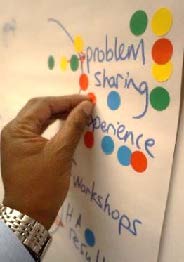First Global Health Accounts Peer-Learning Workshop
Categories: Announcements, Where We Work
In November 2016, over 60 government technicians, policymakers, and technical advisors from 47 countries across the Americas, Africa, Asia, and Europe participated in the first Global Health Accounts Peer-Learning Workshop. During this workshop, participants shared their experiences and ideas on how to improve Health Accounts production and increase the uptake of Health Accounts results for policy.
 Hosted by the USAID Health Finance and Governance (HFG) project in collaboration with the World Health Organization (WHO) and the Bill and Melinda Gates Foundation, the workshop brought together Health Accounts practitioners from around the world.
Hosted by the USAID Health Finance and Governance (HFG) project in collaboration with the World Health Organization (WHO) and the Bill and Melinda Gates Foundation, the workshop brought together Health Accounts practitioners from around the world.
The aim of the workshop was to (1) bring together Health Accounts practitioners to share strategies to overcome challenges when producing and using Health Accounts; and (2) provide an environment for practitioners to build relationships and long-lasting networks so participants could continue to learn from each other after the workshop. As a result, participants would have a better sense of tried-and-tested solutions to the challenges they face when producing and using Health Accounts. The workshop was also an opportunity to inform the WHO’s global health resource tracking strategy. Participants found the workshop helpful for addressing common challenges and connecting with peers: on average, each participant connected with 10 new Health Accounts colleagues from other countries during the workshop.
Topics covered included stakeholder engagement, effectively managing a Health Accounts exercise, cost-effective data collection, tailoring data analysis to a country’s health priorities, and how to use Health Accounts to inform health policy. Three main themes emerged from the workshop:
- Theme 1: Planning effectively for a Health Accounts exercise
- Lack of buy-in from influential stakeholders, insufficient resources, and a process that is out-of-sync with the annual health planning and budgeting process were identified as key challenges in planning Health Accounts exercise.
- A key strategy used by many countries is to build alliances with key stakeholders early on in the process—including stakeholders who will provide data for the Health Accounts and those who will benefit from the data, such as civil society.
- It is important to communicate regularly with stakeholders, to understand the key policy questions that they are grappling with and what the Health Accounts can help to answer.
- Theme 2: Producing Health Accounts
- All country participants expressed the desire to institutionalize Health Accounts by regularly producing and using Health Accounts results through a process that is government-led.
- Participants recommended maximizing the use of existing data to reduce time and cost of data collection. Over the long run, data collection should be integrated into existing systems to ensure regular collection of health spending data.
- If primary data collection is necessary, this process should be made as simple as possible for the data provider, with the benefits of the data explained to them to incentivize their participation.
- Theme 3: Using Health Accounts Data to Inform Health Financing Policy
- Participants described a lack of awareness and understanding of the Health Accounts results among key policymakers in their country as a limiting factor to using the results.
- To remedy this situation, Health Accounts teams need to listen to stakeholders’ needs and wants during the planning phase, tailoring the data collection and analysis to address said needs.
- Health Accounts data should be widely disseminated and packaged in a format that is clear and digestible for readers, without requiring in-depth knowledge of the framework. Many participants said long, descriptive Health Accounts reports did not directly address policymakers’ concerns.
- Communication materials should be as user-friendly as possible; participants noted that short documents, such as policy briefs, brochures, or technical notes that address a specific policy question tend to be more effective than long, generic reports.
 Learn more about the discussions at the workshop by reading this brief→
Learn more about the discussions at the workshop by reading this brief→



